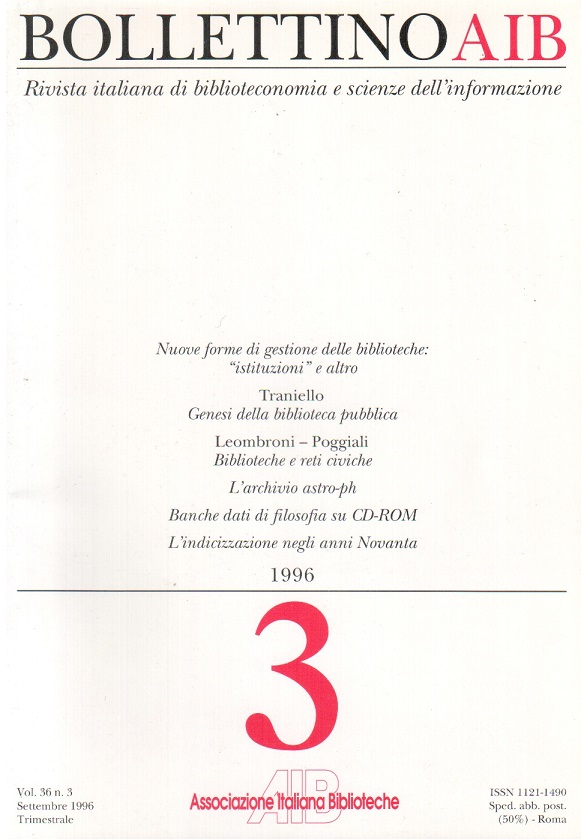Un istituto dell'autonomia locale: la biblioteca pubblica contemporanea nella sua genesi storica
Contenuto principale dell'articolo
Abstract
Although Italy has a long-standing and important tradition as regards public libraries, the modern notion of public library has still to achieve a clear definition and precise application.
On the theoretical plane, the concept of public library was related to an abstract idea of democracy which derived from the Anglo-Saxon, and in particular North American, world. This formulation was however too openly ideological, and although it did serve in some cases to promote the institution of services which drew on international experiences, it was incapable of bringing the true innovative character of this institution fully to the fore.
If we look at the origins of the public library in Great Britain, it is immediately obvious that the design which led to its birth and was reflected in the work of the Select Committee of 1849 contained a clear and precise reference to the public libraries which already existed in Europe: the French, Belgian, German and Italian libraries were considered "public" as they were open for public use and it was precisely this aspect it was desired to implement in Britain.
However, when the bill was debated in the House of Commons, the function of the public library was linked to the social, cultural and moral improvement of the working classes, a perspective which was little different from that which inspired the movement for "popular libraries" in the rest of Europe.
The distinguishing aspect of Anglo-Saxon public libraries should therefore be sought not in how the public nature of the library service is viewed, but rather in two other fundamental aspects. First, the direct and sole attribution of the local community with all power and responsibility, firstly economic, vis-à-vis the public library: the public library is thus a typical self-governing institute and in this very specific and concrete sense can also be considered an expression of democracy. Second, the response the public library was called upon to furnish from the very outset to demands for "useful knowledge" within the ambit of the industrial society, i.e., the informative, and not conservative, function it was charged with providing to respond to the needs of local taxpayers.
It would probably be erroneous to believe the Public Libraries Act of 1850 heralded the birth of an institution which could immediately ensure the participation of all social classes in the country's cultural life; on the contrary, this has probably never been fully achieved. Nonetheless, the public library has made possible the birth of local library systems conceived and equipped as instruments of social information and communication. This was the case initially mainly in cities, where the process of industrialisation was in full swing in the last century, with significant financial and cultural consequences, while the adequate development of public libraries in rural zones dates, in Great Britain at least, to the period immediately following the First World War and in most of Europe, including Italy, to as late as after the Second World War.
Dettagli dell'articolo

Questo lavoro è fornito con la licenza Creative Commons Attribuzione - Condividi allo stesso modo 4.0.
